Top 29 Quotes & Sayings by Haile Gerima
Explore popular quotes and sayings by an Ethiopian filmmaker Haile Gerima.
Last updated on April 14, 2025.
The true story is that black people need to tell their history. Very few films are made by black people about slavery. That itself is a crime because slavery is a very important historical event that has held our people hostage. Forget white people's role in it. In the end what's important is black people remain and live with the scars and psychological issues.
It's not always expected of filmmakers to do stereotyped stories. But one has to be willing to travel to festivals and hook up with people, engage people intellectually about your passion and the kinds of films that interest you, and sooner or later you find people that have the same affinity that you have.




















